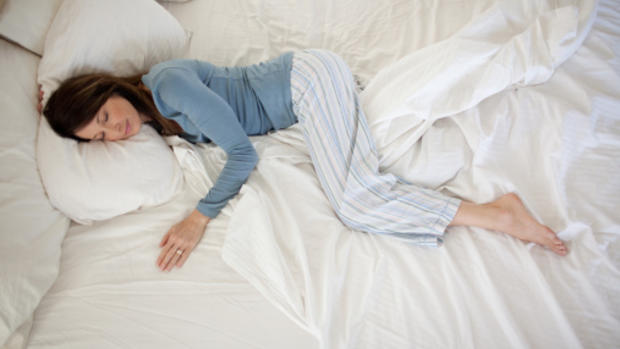Could a healthier diet help you sleep better?
Could more veggies and oatmeal be the best sleep medicine?
New research suggests that what you eat day-to-day can affect the quality of your sleep.
The small study of 26 participants found that people who ate less fiber and consumed more fatty foods, specifically those higher in saturated fats (think butter and ice cream), experienced less deep, slow-wave sleep. Higher sugar intake was associated with more wakeful periods.
"Our main finding was that diet quality influenced sleep quality," said principal investigator Marie-Pierre St-Onge, in a press statement.
The study participants -- half men and half women -- spent five days and nights at a sleep lab. By day, their diets were monitored, and while they snoozed researchers conducted a polysomnography, a sleep study which involves monitoring brain waves, oxygen levels, heart rate and other factors to detect changes in normal sleep cycles.
During the first four days, participants ate a controlled, nutritionist-designed diet. Then on the fifth day, they made their own food selections. Sleep data were analyzed from the third night -- after three days of controlled meals -- and the fifth night, after they chose their own foods.
Participants fell asleep faster -- in only 17 minutes, on average -- when they ate the nutritionist's planned meals, which were lower in saturated fat and higher in protein than the meals they chose for themselves.
It took an average of 29 minutes to fall asleep after eating the food and drinks they picked for themselves.
"It was most surprising that a single day of greater fat intake and lower fiber could influence sleep parameters," said St-Onge, who is also an assistant professor in the department of medicine and the Institute of Human Nutrition at Columbia University Medical Center in New York.
Frank Scheer, an expert in the division of sleep medicine at Brigham and Women's Hospital, who was not involved with the study, said there is a general interest in the effect of diet on sleep but there are very few studies that investigate the relationship. He said the new study does not provide information on the cause-and-effect of certain foods.
"The current study finds a correlation between fiber and saturated fat content of self-selected food items and deep sleep between different individuals," Scheer said, but more experimental studies are needed to explore diet's influence on sleep, he told CBS News.
But some experts have some guesses.
"We don't know 100 percent for sure, but we think that the increase in the sugars and the fats actually move your circadian rhythm," clinical psychologist and sleep medicine specialist Michael Breus told "CBS This Morning." "It kind of turns people into night owls and it pushes their melatonin production later, which makes it more difficult to fall asleep."
Dr. Shalini Paruthi, a fellow of the American Academy of Sleep Medicine and an associate professor of internal medicine and pediatrics at SLU School of Medicine, also said it's important to note that the study is a small and limited.
"We have to keep in mind this was definitely a pilot study," Paruthi said, stressing that the take-home message isn't about eat this/not that and you'll sleep better. "The takeaway is a little broad."
She noted that only 30 percent of the participants who ate whatever they wanted on the last night took longer to fall asleep -- that not everybody responded the same way to the diet changes.
But it's helpful research in that it suggests some people's sleep may respond to diet changes. "For people really having a sleep problem, this gives us information and insight that maybe we need to look at their diet," Paruthi said.

